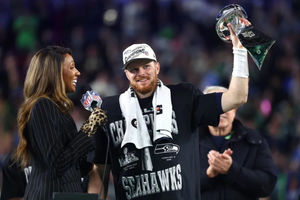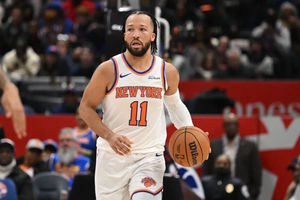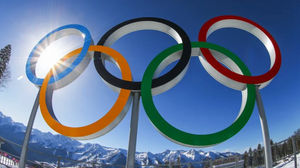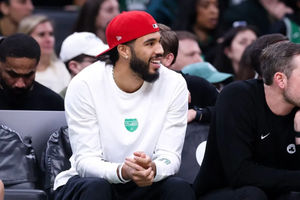Bill Russell, an OG in the Fight for Equality, Swats Down Trump's Nonsense
 President Obama gave Bill Russell the Medal of Freedom in 2010. credits: Getty Images
President Obama gave Bill Russell the Medal of Freedom in 2010. credits: Getty Images Bill Russell is no stranger to the fight for equality.
An 11-time NBA champion, and the first black head coach in NBA history, Russell has used his platform for decades to stand against institutional racism.
Early Saturday morning was no different. The stoic and outspoken Russell called out President Trump on Twitter for his recent comments.
“I think I’ve done more for the Black community than any other president besides Lincoln,” Trump said.
Russell responded in a tweet pointing out just some of Trump’s racist and idiotic decisions that have impacted the black community.
He lobbied for the death penalty to be issued against the Exonerated Five, a group of young Black and Latino teenagers who were wrongly convicted of raping a white woman in Central Park. Since taking office, Trump has refused to apologize for his comments, which helped paint an image of guilt against these children and increased harmful stereotypes about young black men.
In 2017, Trump referred to Colin Kaepernick and other NFL players who wanted to peacefully protest issues like police brutality sons of bitches.
Recently, he tried to intimidate protesters in the streets fighting for equality with violence and used a 1967 quote “When the looting starts, the shooting starts,” from Walter Headley, a racist police chief in Miami, to further drive home his point. Also, he had peaceful protesters forcefully removed with tear gas from a park in D.C. just so he could walk a couple of blocks and frown with a Bible in his hand.
Trump has made insensitive comments about George Floyd, ad while changing the original date of a rally planned in Tulsa, Okla., on Juneteenth, known white supremacist Stephen Miller is still reported to be the writer of Trump’s speech on race relations during the rally.
Tulsa is where white mobs destroyed an affluent black community called Black Wall Street in 1921, and killed hundreds of Black people.
These are just the instances Russell could fit into a 256-character tweet limit. Trump’s failure to reach the black community is far greater than these few incidents.
Should I mention his response to Charlottesville? What about his willingness to call black protesters “thugs” while defending white groups who storm capitol buildings armed with assault rifles?
And this doesn’t even include his attacks on prominent black sports figures like Steph Curry and LeBron James.
Russell has been through the trenches of fighting for social justice. He knows the problems posed to this country by leaders like Trump.
Russell was influential in working with the National Association for the Advancement of Colored People (NAACP) throughout his life.
When Medgar Evers, one of the most influential civil rights advocates in history and first NAACP field officer in Mississippi, was shot dead at his Jackson home in 1963, Russell was prompted to make an impact.
Edgars was key in helping to lead boycotts of white merchants and also was a main force behind desegregating the University of Mississippi. University leaders were forced to enroll James Meredith, their first black student, in 1962.
Russell called Evers’ brother after his death and they talked about what the NBA star could do to help the cause. They decided that Russell would lead one of the first integrated basketball clinics in the heart of one of the most racist places in the South.
The camp was a success, but Russell had to be followed by a constructed security team during his time in Mississippi after receiving death threats for his actions.
Despite the challenges, Russell’s works didn’t stop there. He was an integral part of the “ Cleveland Summit” in 1967 to show support for Muhammad Ali in his fight against serving in the Vietnam War. One of the main reasons Ali refused to fight was because of the continued mistreatment of Black Americans.
A year later Russell was forced to lead his Celtics squad as a player-coach in the 1968 playoffs at the same time Martin Luther King Jr. was assassinated. Game 2 of the Eastern Division Finals vs. Wilt Chamberlain and the Sixers was delayed to honor Dr. King, both Russell and Chamberlain attended his funeral in Atlanta during the series. Russell would end the 1968 season winning his 10th championship as a player and first as a coach.
Even after his playing career was over, Russell has been a fixture of social justice and athletic greatness.
In 2011, Russell was honored as a recipient of the Presidential Medal of Freedom from President Barack Obama, a reward that celebrated Russell’s decades of service battling inequality and social issues.
Even at the age of 86, Russell is still focused on progress in our society.
Though his glory days are long gone, he knows the struggle of the black community isn’t over. This is why he must continue to speak and continue to condemn divisive and racial rhetoric from people like Trump.
Russell’s athletic feats may be a thing of the past, but his intellectual greatness is still pushing the world forward.
Related
The Biggest Question Facing Every 2026 MLB Contender
Best NBA Betting Picks for Wednesday Feb. 11th Slate
Atlanta Falcons Bet Big on James Pearce Jr. — and Lost
Why the Road to Super Bowl LXI Runs Through the NFC West
- Super Bowl Betting Preview: Seahawks vs. Patriots Breakdown & Pick
- The Most Fun Super Bowl Prop Bets You Can Make This Year
- Super Bowl 60 Prop Bets: 10 Best Bets for Patriots vs. Seahawks
- UFC Fight Night at the Apex Best Betting Picks and Predictions
- NBA Betting Picks for Friday Feb. 6: Post-Deadline Predictions
- Best College Basketball Betting Picks for Thursday, February 5th
- Edmonton Oilers vs. Calgary Flames Feb 4 NHL Betting Picks












